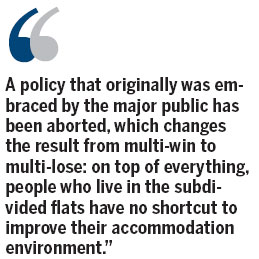Multi-lose accommodation
Updated: 2013-08-08 07:20
By Eddy Li(HK Edition)
|
|||||||

Last year, the SAR government announced a package of short- to mid-term housing and land supply measures to alleviate the problem of housing shortage, including allowing suitable industrial buildings to be converted into public rental housing or "transitional accommodation", in order to increase housing supply.
Recently, however, the Development Bureau tabled a proposal at the Legislative Council (LegCo), suggesting that the above-mentioned policy put forward by the government last September was not feasible. Officials from the bureau were also present at LegCo to explain why they wanted to withdraw the policy. They believe that many aspects, such as plot ratios, ventilation, natural lighting, and others, cannot meet the requirements stated in the Building Ordinance. If converted according to legal standards, the buildings will need a large-scale reconstruction that involves complicated engineering and high costs; therefore, the bureau finds the policy financially impractical and unworkable.
I have always been a supporter of the revitalization of old industrial buildings, and when the government first put forward the policy of converting suitable buildings into transitional accommodation, I wrote several articles on the topic analyzing obstacles to its execution - which, coincidentally, are similar to the reasons of the Development Bureau. At that time, I didn't regard this as an impractical plan, provided that the SAR government was willing to make certain amendments to remove the restrictions on the outlook of a building - to allow owners to move some walls to the inside, or set courtyards in the buildings, and permit height compensation for lost areas. By doing this, lots of windows will be added, so as to conform to the regulation that "no part of any room used for habitation shall be more than 9 meters, measured within the room, from a prescribed window which faces directly into the external air".

The future rental income will be an incentive for factory owners. Now that technically it can be solved, owners can consider whether it is worth the investment. The government shouldn't exceed their duties and meddle in others' affairs in this respect, making the withdrawal of the policy less reasonable.
Moreover, the government allows the transformation from old industrial buildings into hotels. Why then is there discriminating treatment towards hotels and small dwellings? The biggest difference would be whether cooking with gas is allowed, given that the natural lighting standards are similar. Regarding this point, the authorities can encourage the transformation with a simple restriction that no cooking with gas shall be permitted. In other words, these converted apartments are just hotel rooms without a central air-conditioning system and hotel management. In this way, a multitude of small units would be on the market in a relatively short period, and the discursive subdivided flats could be gradually replaced as well.
A policy that originally was embraced by the major public has been aborted, which changes the result from multi-win to multi-lose: on top of everything, people who live in the subdivided flats have no shortcut to improve their accommodation environment; secondly, the housing shortage is unprecedentedly severe for the government; moreover, there will be one less choice for the factory owners to choose from with regard to how to revitalize their old industrial buildings; last but not least, the whole society will have to spend much more money, and devote land and other public resources to deal with the grassroots housing issues.
In conclusion, I sincerely hope that the SAR government will consider their policies more carefully before making any irreversible decisions.
The author is vice-president of the Chinese Manufacturers' Association of Hong Kong.
(HK Edition 08/08/2013 page1)